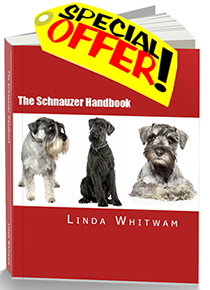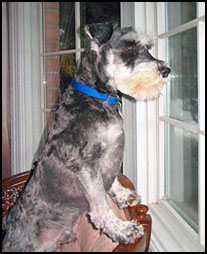|
Dog Separation Anxiety - the SymptomsDogs AND Humans Are Affected Dog Separation Anxiety is a growing problem. It's not just Schnauzers that experience separation anxiety - people do too. About 7% of adults and 4% of children suffer from this disorder. Typical symptoms for humans are:
Our canine companions aren't much different.
It's estimated that as many as 10 to 15 per cent suffer from dog separation anxiety (or "seperation anxiety" as it's often mis-spelled). It is on the increase and recognized by behaviorists as the most common form of stress for dogs. Schnauzers are no more or less likely to suffer from dog separation anxiety than other breeds of dog. It has more to do with the character of the dog and how you treat him or her than with any specific dog breed. Distressing It can be equally distressing for the owner - I know because Max suffers from this. He howls the place down whenever we leave home without him. Although, if we silently sneak back home and peek in through the letterbox, he’s never asleep. Instead he’s waiting by the door looking and listening for our return. It can be embarrassing. Whenever I go to the Post Office, I tie him up outside and even though he can see me through the glass door, he still howls his head off! Luckily the lady behind the counter is a dog lover and, despite the large GUIDE DOGS ONLY sign outside, she lets Max in. He promptly dashes through the door, sits down beside me and stays quiet as a mouse! Tell-Tale Signs of Dog Separation Anxiety Does your Schnauzer do any of the following -
If so, he or she may suffer from Dog Separation Anxiety. Fortunately, in many cases, Dog or Puppy Separation Anxiety is curable. Follow this link below to find some tried and tested techniques which may help your pet overcome his anxiety: Useful Techniques for Dealing with Dog Separation Anxiety
|
AVAILABLE ON AMAZON AS PRINTED BOOK AND KINDLE! The definitive manual for owners of Miniature Schnauzers, Giants and Standard Schnauzers

"The Schnauzer Handbook is brilliant and covers almost all you want to know about the breed," Michele L, Bournemouth
"A thoroughly interesting and entertaining book. There’s hardly anything about schnauzers that isn’t in here - it even made me smile!" J. Garrard, Ormond Beach, Florida





